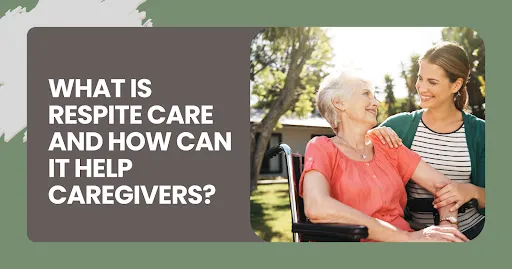
What Is Respite Care and How Can It Help Caregivers?
Cynthia had been taking care of her mother for nearly three years. What started as helping with groceries and transportation gradually turned into full-time support, managing medications, assisting with bathing, and preparing every meal. Over time, her days grew longer, her nights more restless, and her social life nearly disappeared. As much as she loved her mother, she often found herself exhausted and overwhelmed, quietly wondering how long she could keep going without a break.
What Cynthia didn't realize at first was that she wasn’t alone—and that there was a solution. A friend gently suggested something she hadn’t considered: respite care for seniors. It was more than just time off. It was a structured, supportive environment that allowed caregivers to step back for a moment, without guilt, while their loved ones received attentive, professional care in a safe space.
In this article, we’ll explore what respite care means, why it’s essential for caregivers, and how it supports both seniors and those who care for them. Whether you're new to caregiving or years into it, understanding this option can bring relief, peace of mind, and renewed energy.
Understanding Respite Care in Simple Terms
Respite care is short-term assisted living that allows caregivers to take a break while ensuring their loved one receives the support they need. These breaks might be for a few hours, a few days, or even a few weeks.
Care is typically provided at an assisted living community, nursing facility, or occasionally in the senior’s own home, depending on the situation. This form of temporary senior care offers more than just supervision or medical assistance—it provides peace of mind to those who’ve carried the full weight of caregiving. It’s a short-term shift in responsibility that allows caregivers to recharge, reconnect with their lives, and return with renewed strength.
The Hidden Weight Carried by Caregivers
Caregivers often carry more than physical tasks—they carry emotional strain, mental fatigue, and sometimes isolation. While caregiving is an act of love, it can also be overwhelming.
Many caregivers report:
Sleep disruption
Loss of personal time
Difficulty maintaining employment
Feelings of guilt, anxiety, or depression
Physical strain from lifting or assisting loved ones
Social disconnection from friends or hobbies
Over time, this can lead to burnout—a state of emotional, physical, and mental exhaustion. Left unaddressed, it not only impacts the caregiver’s health but can also affect the quality of care they provide.
Respite care offers a pressure release valve, permitting caregivers to pause without abandoning their role.
How Respite Care Helps Caregivers
Let’s break down the core benefits of respite care for caregivers, not just as a convenience, but as a necessity for long-term health and sustainability.
1. Physical Relief
Daily caregiving can be physically demanding. Whether it's lifting, supporting mobility, or assisting with bathing, it can take a toll. Respite care gives the body time to rest, recover from stress, and even receive medical attention or therapy if needed.
2. Emotional Recharge
Caring for someone you love can stir up complex emotions—frustration, sadness, guilt, or even resentment. Time away allows caregivers to reconnect with themselves, regain perspective, and return more emotionally balanced.
3. Restored Sleep and Energy
Many caregivers report disrupted sleep due to nighttime caregiving or stress. During a respite break, caregivers can get consistent, uninterrupted sleep—a major factor in mental clarity and physical wellness.
4. Time for Personal Needs
Doctors' appointments, catching up with friends, attending life events, or simply enjoying a quiet moment with a book—these are not luxuries. They are necessary parts of a full, human life. Respite care allows caregivers to handle personal needs without sacrificing the care of their loved ones.
5. Reduced Guilt and Burnout
One of the most powerful things respite care provides is permission. It helps caregivers understand that needing help doesn’t make them weak—it makes them wise. That they can step back, breathe, and know their loved one is in trusted hands.
What Caregivers Can Expect During a Respite Stay
During a respite stay at an assisted living community or care facility, your loved one will receive structured, compassionate support, including
Assistance with daily living tasks
Medication reminders and monitoring
Nutritious meals and hydration
Opportunities to socialize and engage in activities
Safe, supervised accommodations
This isn’t just about safety—it’s about quality of life. Many caregivers are surprised to hear that their loved ones enjoy the change in scenery, conversation, and stimulation, even during a short stay. Meanwhile, the caregiver gains the breathing room they need.
It's Not Selfish—It's Sustainable
One of the greatest challenges caregivers face is guilt. But taking a break doesn’t mean you love your parent or spouse any less. It often means you love them enough to keep yourself well so that you can continue supporting them in the long run.
Respite care isn’t about leaving—it’s about sustaining. It's how long-term caregivers stay healthy, sane, and capable of continuing to show up.
When Should You Consider Respite Care?
If you’ve found yourself saying
“I just need one weekend to catch up on rest.”
“I want to attend my friend’s wedding, but I can’t leave.”
“I feel like I’m on the edge of burnout.”
“I don’t remember the last time I had a moment to myself.”
Then, respite care is worth considering.
It’s not just for emergencies. You can plan for breaks every few months or even build it into your routine. Some caregivers use it weekly or monthly as part of a balanced care plan.
Frequently Asked Questions
Is respite care only for elderly people with major health issues?
Not at all. It’s for any senior who needs support while their caregiver takes a break, whether due to mobility challenges, recovery, or routine needs.
How do I know if I’m experiencing caregiver burnout?
Signs include fatigue, irritability, forgetfulness, and feeling emotionally detached. If caregiving feels overwhelming, it’s time to consider support.
Can I use respite care more than once?
Absolutely. Many caregivers schedule it regularly as part of their long-term care strategy—monthly, quarterly, or as needed.
What if my loved one struggles with new environments?
Trained staff help gently introduce seniors to the community and confirm they feel safe and connected. Many seniors enjoy the change of pace.
Will respite care interfere with our regular care plan?
Not at all. It complements your plan by maintaining continuity of care while giving you the freedom to rest and reset.
Final Thoughts
Caring for a loved one is one of the most generous acts a person can offer—but it should not come at the cost of your health and well-being.
Respite care for seniors is more than a service. It’s a lifeline for caregivers—offering relief, support, and space to renew. Whether for a weekend, a week, or longer, temporary senior care gives caregivers the strength to keep going with compassion and clarity.
If you’ve been waiting for the right time to ask for help, this might be it.
Reserve a short-term stay or speak with our team today at The Walnut Villa about how respite care can support you and your family.

Facebook
Instagram